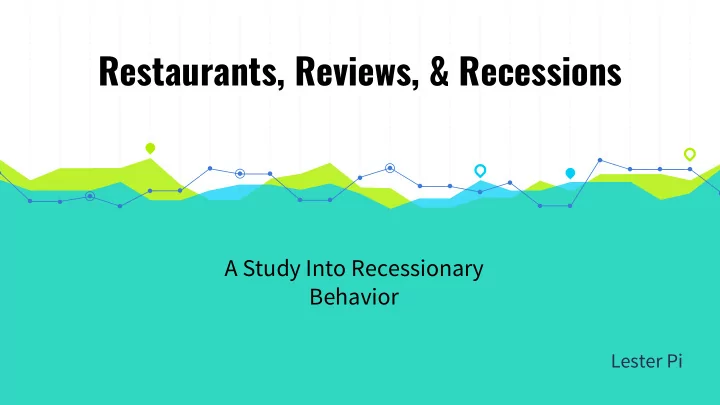

Restaurants, Reviews, & Recessions A Study Into Recessionary Behavior Lester Pi
Research Question Can restaurant goers’ behavior be analyzed and modeled during a U.S. recession?
The Solution?
The Data ◉ Yelp ◉ FRED ◉ Yahoo Finance ◉ BEA
Yelp Challenge 9 Data ◉ Business ◉ Review ◉ User ◉ Check In ◉ Tip More information on this dataset here: https://www.yelp.com/dataset_challenge ➔
The Process 1. Exploration 2. Data work 3. Find connections 4. Model
Challenges and Issues Addressed Yelp Data spans globally ❖ Subset only U.S. businesses and examine The Great Recession in the U.S. ➢ Low number of observations on heads and tails ❖ Set date range to handle statistical significance and heteroskedasticity ➢ Only a Yelp-decided subset of their data ❖ Potential bias, but can only hope it is a representative sample of population ➢ Endogeneity ❖ Attempt to confirm or reject cases of endogeneity ➢ And many more ❖
Does Yelp’s Company Performance Matter?
Nope Granger Causality Test shows that Yelp stock growth does not granger cause the growth of new yelp users (p-value: .6265).
Quantifying With Users and Reviews However, new users basically represents new reviews. Let’s just use reviews because they tell us more.
New Reviews by Month
Average Review Scores by Month Growth rates do not make Sense for ratings Use review score levels Sharp drop, slow recovery
Examining Behavior To examine behavior, the different dynamics of price levels need consideration. Yelp has a category for “price” of a business represented by dollar signs ($). We will be using detrended and seasonally adjusted data, except for review scores since the range of values have been standardized.
Split by Dollar Signs
A Picture is not Always Worth 1,000 Words Visually, it looks that ($) and ($$) have a decline in the number of reviews, but the statistics tell a different story when regressing reviews on recession. Recession ($) ($$) ($$$) ($$$$) coefficient: -236.11 -495.52 -100.01 -28.960 p-value: 0.460 0.470 0.00075 *** 0.0128 *
Do People Become Stingier? It looks as if people are reviewing ($$$) and ($$$$) restaurants less during a recession while ($) and ($$) restaurants are unaffected. This helps add to the argument that people’s behavior change during a recession.
We Can Always Do Better How about controlling for the number new reviews among all restaurants? Lets add in the detrended and seasonally adjusted data.
A Better Regression ($) ($$) ($$$) ($$$$) Recession coefficient: 33.324607 84.734117 -85.505163 -3.239e+01 p-value: 0.192 0.00349 ** 0.000406 *** 0.00328 ** New coefficient: 0.311485 0.670808 0.016770 -3.962e-03 Reviews p-value: <2e-16 *** < 2e-16 *** 1.25e-13 *** 3.78e-05 *** (adjusted)
Where Do People Eat? These are very interesting results. During The Great Recession, ($$$) and ($$$$) see less reviews while ($$) see a boost in reviews that they otherwise would not have seen. It seems like people are opting more for ($$) when eating out rather than ($$$) and ($$$$).
Split Scores by Dollar Signs
Which Scores Go Down? Now, lets regress the review scores on the recession. Remember that review scores are on a scale of 1 to 5. Recession ($) ($$) ($$$) ($$$$) coefficient: -0.044273 -0.076331 -0.020898 0.03506 p-value: 0.0653 . 0.000172 *** 0.333 0.203
Why Do We See This? The ($) and ($$) restaurants see a slight dip in review scores during The Great Recession. Why is this? It could be people who would have otherwise dined at a ($$$) or ($$$$) are switching to the lower priced restaurants and do not have their expectations met. Or… Maybe people just want more bang for their buck? Is there a way we can see this?
Sentiment Analysis By analyzing the text in reviews, we can see their related sentiments. Since The Great Recession occurred a few years after the start of Yelp, this sentiment analysis will only consider two time periods: 1. Start of December 2007 - Start of June 2009 2. Start of June 2009 - Start of December 2011
Word Clouds: Which is From The Recession?
Again, Which is Which?
A Closer Look Negative Positive % Negative Cheap Rank Expensive Rank Recession 158714 346991 31.4% 3rd 7th After 733329 1731938 29.75% 5th 8th We can see there is a slightly stronger negative sentiment during the recession. Also, take a look at where the words “Cheap” and “Expensive” rank for negative words. Although “Cheap” is not always used in a negative way, it does indicate, along with “Expensive”, a stronger price sentiment.
Coming Full Circle Can we connect our Yelp data with restaurant expenditures? After finding a potential granger causality of restaurant expenditures granger causing the number of reviews, we can attempt to build some VAR models.
VAR Results The VAR results are not as sound as our previous results. Although there is some significance spread throughout the different VAR models, I would not say it is strong enough to conclude a strong enough causality. This could be due to keeping the VAR in adjusted levels, where not all of the data was stationary. This was done because growth rates did not make sense in some cases.
Summary Pt. 1 ◉ People’s restaurant reviewing behavior does change during The Great Recession. ◉ Yelp company performance doesn’t matter. ◉ The Recession lowers the number of ($$$) and ($$$$) reviews, but increases ($$) reviews. ◉ There is no evidence of an effect on the number of ($) reviews.
Summary Pt. 2 ◉ Review scores in The Recession drop for cheaper restaurants, but stay constant for expensive ones. ◉ People care more about prices during The Recession. ◉ Comprehensive VAR models connecting previous findings with restaurant expenditures is pointing towards a full model, but not conclusive.
Recommend
More recommend